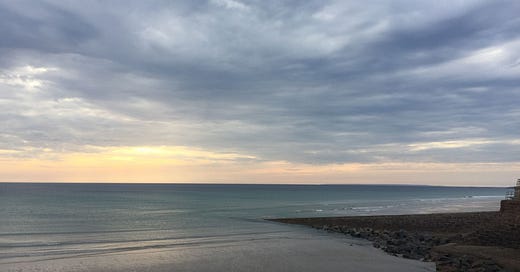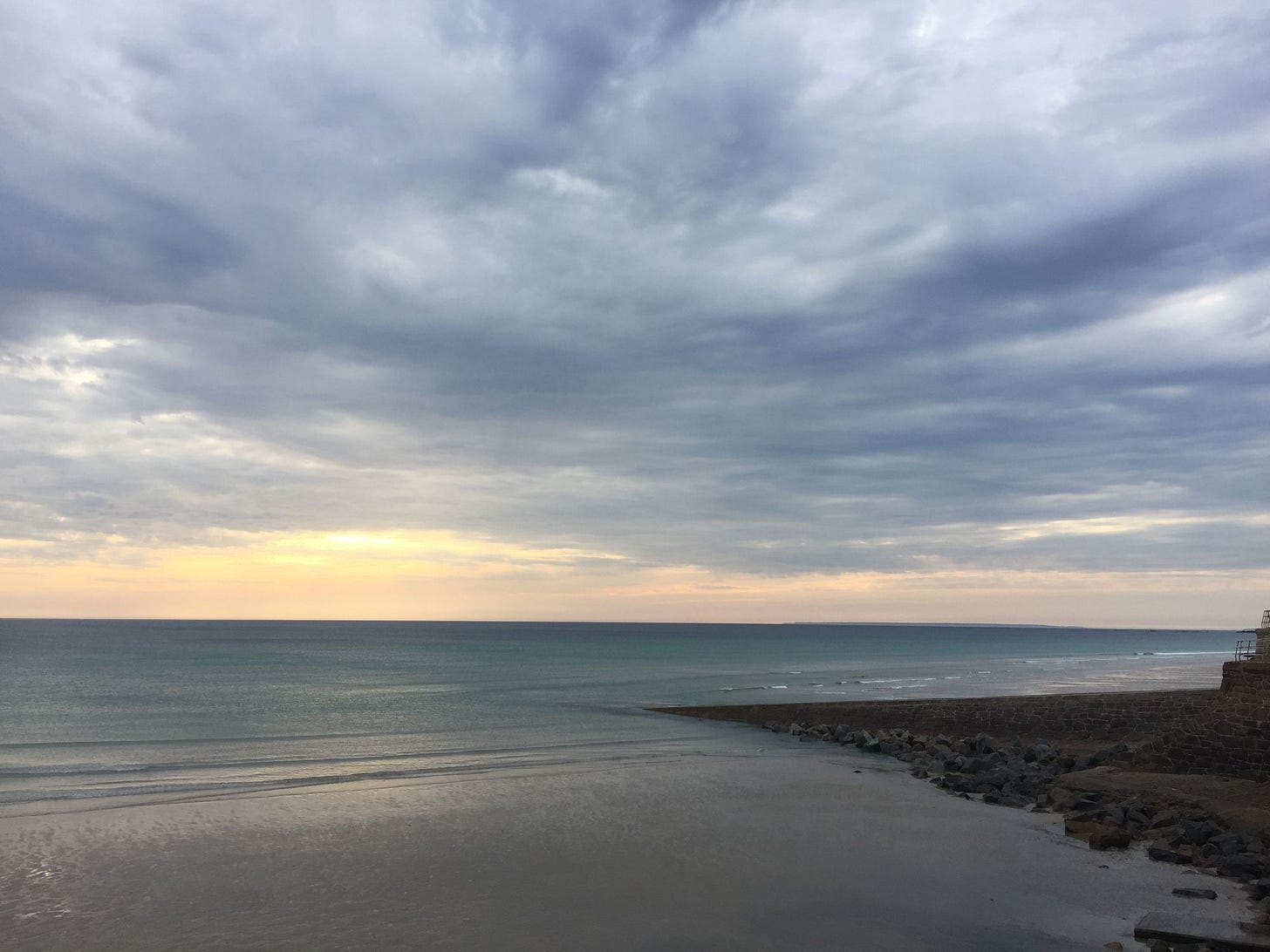Harry Vardon - King of Clubs - Part 3
Welcome to another episode of the History Islands. I'm Paul Darroch, and today we are continuing the story of the golfing legend, Harry Vardon.
[Warning: this true historical story contains themes of baby loss and bereavement]
Harry Vardon was born in Jersey and went on to become one of the greatest golfers of all time. In our previous chapter, we left this glitteringly talented young man poised on the cusp of a promising golfing career, and about to become a father. Yet fate was about to deal him the cruellest tragedy of all, for his newborn son Clarence died after just six weeks. We rejoin the story in the aftermath of those terrible days.
Harry Vardon, 7 Kensington Place, St Helier
15th August 1892
Clarence is gone, and the curtains in this house will never open again. Jessie refuses to leave her room. And perhaps I too will be forever trapped somewhere in this hell, amid the dark purple wallpaper, where the oil lamp flickers by the bed, in the soot-blackened streets of this grimy town.
By day, I retreat to the links at Grouville, losing myself in the course, trying to block out the pain, knowing that the wound will never cease to bleed. I no longer play with joy. I play with precision. I play with the coldness of a machine.
I think about the timid young boy who stumbled into his first victory at the Royal Jersey Golf Club, just a few short years ago. Old Major Spofforth slapped me on the shoulder after I lifted the trophy. “Henry, my boy, never give up your golf, it may be useful to you one day”. He had a Latin phrase he would roll in his mouth like one of his fat cigars: Nil desperandum. Never give up. Never despair.
His words ring hollow and mocking now. There is nothing left for me here, nothing left to lose. My ticket to Southampton is booked and tomorrow, I will take my heart in a bag and leave behind everyone I have ever loved. I will walk my path alone.
Harry Vardon, New York City, February 1900
Troubling dreams, yet again, of people and places lurking below the surface, of things and times I wish I had forgotten. I yawn my way awake in my first-class suite, and after a hearty breakfast and a refreshing pipe-smoke, I catch my first glimpse of the Promised Land.
The dull copper giant of the Statue of Liberty is guarding the bay, her hand holding a burning torch towards me. The vast headland of Manhattan is advancing to greet me after my decadent week at sea. A forest of grey towers lies beyond, rising like stalagmites in a cave, and the sheer size of them is like nothing I have ever seen. This, then, is New York City: a hive of five boroughs, three and half million souls; and it seems like they have all been expecting me.
When the St Paul slides into its prime berth on the American Line Pier, I am one of the first to disembark. The press are crouching in wait as I saunter down the saloon passengers’ gangplank. A three-times Open Champion can hardly expect to travel incognito. In the days to come the New York press will dissect every detail of my arrival; noting my long blue coat with the fur lining, the cut of my hat and even my fresh tan shoes. They will complain that I look more like a theatre impresario than a professional golfer. As if they expected me to be hauling my own set of clubs down from the stateroom!
Amusingly, the customs inspectors try to detain my box of clubs and tried to levy US import duty; but my agent points out they are “the tools of my trade”. After diligently consulting the regulations book, the customs officer waves them through, free of charge, and they are couriered to my suite.
Charles S. Cox, my U.S. manager, meets me at the docks, ushering me away from the press pack, and bundles me into a cab. The horses crack into a brisk trot and I am soon whisked to the very heart of the metropolis, straight to the Broadway Central Hotel.
As soon as I arrive in the lobby, the American press ambush me again. They really don’t give a chap space to breathe, peppering me with questions – about golf, about my itinerary, about every aspect of my daily routine. At times I can scarcely mumble a word in edgeways. Charlie proves the consummate showman, completing their wisecracks, providing a pithy retort here and there and shielding me from their more brazen impertinences. Still, their energy and enthusiasm feels rather charming, like a cup of hot cocoa brimming over; a Labrador’s warmth after the arch and feline London pressmen. At last, Charlie calls time and ushers me away.
Later, in my lavish room, I begin to practice my drive.
They say the Broadway Central is one of the finest hotels in America. It squats like a prize peacock between Amity and Bond, eight storeys and four hundred rooms of gilded opulence. Charlie tells me a story as he escorts me to my suite. Back in ’72, he says, a tycoon was shot to death on the staircase. It was an affair of the heart, a seething jealousy over a shared mistress. It’s usually the madness of lust that leads men to murder, he says.
I think of that dramatic story later, as I practice my shots alone. My own heart is suspended in ice. I think of my wife Jessie back home, locked in her grief, like a bird slowly dying in her cage. Since we lost our baby, she has retreated behind so many walls. For three years she refused to follow me to England. She cared nothing for my burgeoning fame and success, finding it a burden and mystery. Eventually, like a crab inching along the beach, she came to join me; but then she miscarried again, and she retreated inside her shell for good. Now her sister Annie cares for her and she rarely leaves the house. She remains trapped by the walls of her mind, even as the embers of her life grow cold.
Back in my room, I swing my clubs with a vengeance. This is where I forget myself, in the form, the obsessive practice, the search for perfection. The press say I am touched by some natural gift; they do not see the hours of toil, the hammering away at the wall, trying to make it all right, trying to bury the pain.
Midnight creeps in, and at last I set my clubs down. The room is stiflingly, cripplingly hot. The Americans adore this new-fangled method of central heating, no doubt essential in the snowy New York winters. Yet the hissing steam pipes are unfamiliar and strange, tormenting me with their loathsome noise. I feel like I have descended into the bowels of hell and have no idea how to cool myself down. I am too embarrassed to reveal my ignorance and ask the staff for help; but I am at my wit’s end as how to solve the problem.
At last I am able to prise open a chink of glass above the door, and cooler air seeps in. Exhaustion overcomes me, and I fall once again into turbulent dreams. I am back in my parents’ cottage in Jersey, long since strangled by the golf course. The rooms are empty now. The people have gone. But the fire in the hearth is raging out of control, and it can never be put out.
To be continued...
Paul Darroch's books bringing Jersey history to life are available at Amazon and at a range of Island bookstores.
The History Islands is also available as a Spotify and Apple podcast. See Linktree for more.




